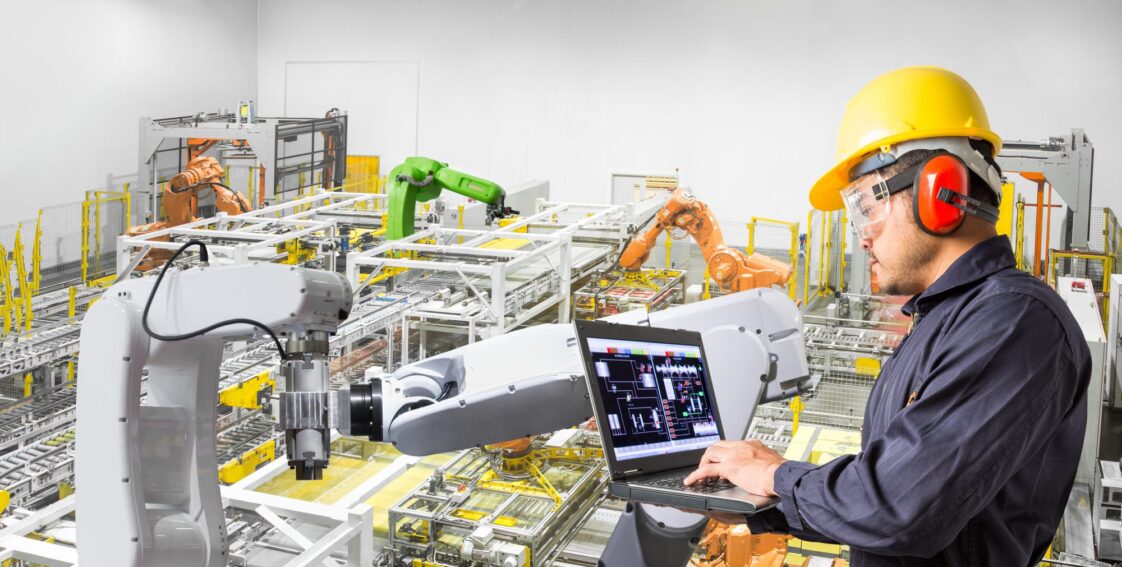
Internal vs External Controls Projects
by Ryan Goad, Controls Engineer and Nick Sadro, Electrical Engineer

 When manufacturing facilities execute a controls system project, they often debate whether to do the project internally or to hire an outside company like Patti Engineering. Especially with large upgrades to new technology – like robots – becoming more prevalent in the automation world, we see our customers having this dilemma more often.
When manufacturing facilities execute a controls system project, they often debate whether to do the project internally or to hire an outside company like Patti Engineering. Especially with large upgrades to new technology – like robots – becoming more prevalent in the automation world, we see our customers having this dilemma more often.
When to Go Internal
There are some benefits to doing controls projects internally. Most manufacturing facilities have a couple permanent employees who are knowledgeable about controls software and are able to make small changes. In plants, there is not a great need to have many controls engineers employed continuously. (If the controls software is written correctly, there is no need to have anyone modifying the software until a major change is needed.) However, if the modifications are simple, then most times it makes sense to have internal engineers complete the project.
When to Hire External Support
For larger projects, is often better to have experienced controls engineers. Experienced control systems integrators might be more expensive up front, but are the cost-effective method in the long run. Large projects typically have a burst of activity for a few months and then die down, so it does not make sense to permanently hire the staff required to complete these projects.
- External Support Has Experience – External support has extensive experience with making major changes and with the latest technology. Usually, the internal controls engineers are not experienced with large higher-level controls projects, because they happen infrequently.
- Experienced External Support Saves Time Up Front– Because of the added experience, hiring external support will help reduce development time. The external staff will not require the added time of learning new software. Experienced controls engineers are able to complete projects much quicker and more efficiently. Although it will be cheaper to go internal, the benefit of extensive experience could keep the project from dragging on.
- New Technology – like Robot Controls – are Easy to Learn, But Take Time to Master – Many new technologies tout improved, user-friendly systems; some collaborative robots, for example. Although internal staff may be able to teach points to the robot easily enough, the external staff will have more experience in knowing how the robot should be taught as well as the different configurations that will make the teaching easier. (One specific example is knowing that the End of Arm Tools that are attached to the robot need to be taken into account as well as the payload involved if the robot is picking and placing. If this is neglected, the robot can wear out its motors and joints a lot quicker than it should – or even collide with other equipment/humans.)
- External Controls Engineers Can Make Ongoing Maintenance Easier– The internal support may pick up on tips and tricks to look out for while dealing with robots or other new automation from the external support. The external staff will know certain techniques that will help the system run better/smoother. Also, software written by external professional controls engineers is usually much more robust and requires less maintenance and upkeep in the long run. Often, additional cost savings of hiring external resources comes after the completion of the project in reduced time spent debugging and providing production support.
- Internal Staff Can Focus Their Time on Other Things – Whether this is focusing on other parts of the project that need attention or different projects altogether, having external support will free up the internal staff from working on the robot-related or major project tasks so that they can focus on things that are within their expertise.
Ultimately, the decision is similar to how you might make DIY decisions at home. If the project is simple and delays won’t disrupt your life – like patching drywall – then it makes sense to do the project yourself. But for larger projects with unknowns and the potential for major disruptions – like replacing the plumbing for the only shower in the house when you can’t see the pipes beforehand – it’s probably less costly and less stressful to call a pro from the beginning.
Related categories: Blog Company
